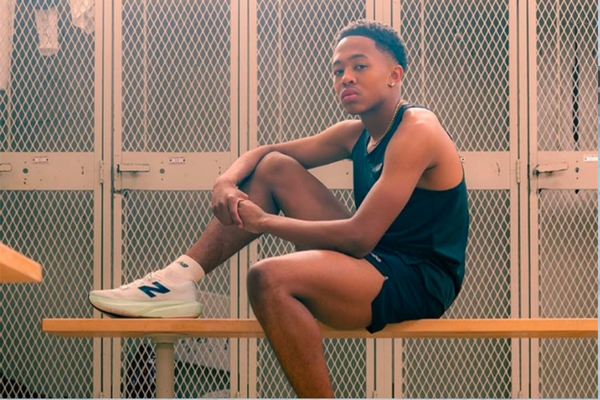

Quincy Wilson’s rise to Olympic glory has been nothing short of phenomenal. At just 17, he has already left a major mark in the history books by becoming the youngest gold medalist for Team USA. He achieved this by winning the 4×400 at Paris 2024. But while pundits and fans were singing his praises, what awaited him at home was totally different. In fact, moving over the win, his folks wanted him to focus on something very different. The prodigy’s parents wanted him to focus on his life outside sports as well.
His unbelievable humor about juggling Olympic gold and high school grind depicts the unspoken truth that many young prodigies face. He recently appeared on the ‘Beyond the Records‘ podcast hosted by Grant Holloway and Rai Benjamin. When asked about his transition from the Olympics to school, he said, “I’ve been out this summer. I didn’t; I was supposed to be doing my reading while I was in the village, man. I didn’t do anything.”
This blunt confession serves the major struggles he confronted, as part of which he strove to match acute athletic success with a list of monotonous chores that belong to any high school kid. As if to mirror his statements, the official handle of the podcast posted a video with a humorous caption. It read, “This gold medalist still has homework. Quincy Wilson talks about coming home after the Paris Olympics and facing unexpected changes—like skipping his high school summer reading.”
ADVERTISEMENT
Article continues below this ad
View this post on Instagram
Going back to Paris, Wilson gave a time of 47.27 seconds for the 4x400m before handing the baton to Vernon Norwood. While this was far from his personal best, he didn’t let his disappointment get the better of him. Remaining calm, he remarked, “Was out there with a great team who was on my side through the whole thing. I wasn’t 100 percent myself, but a team came out here and did it for me.”
Further, in the podcast, Wilson talked about how his parents want him to focus on academics. Upon returning home, Wilson’s mother ensured he caught up on his academics. He recounted, “I went home; I did the reading for like two days. My mom said, Bro, you think you’re getting out of it.” Despite his win, however, his family pushed the importance of education to him.
Quincy also shared an incident during this time. He was caught saying, “Like the jokes that were on TikTok, but those things were real. My mom was like, You’re reading this book. Like, I had a 600-page book and then a 200-page book that I had to read.” But while some might criticize his actions, we know having a backup plan doesn’t hurt. Not when the NIL deals fluctuate like anything.
Quincy also delves into his remaining time at school. He mentions, “I got two more years of this high school. It’s just like, I’m going to just let it plan out. We gonna see what these two years go. You never know; if I run 43, you never know.” While he is not yet sure about his academic future, he got some solid advice from Halloway and 3-time Olympic champion Rai Benjamin. The two legends suggested he get college experience no matter how little. After all, this will help him in his future, where he’s trying to juggle both athletics and academics.
What’s your perspective on:
Quincy Wilson: Olympic gold at 17, but is schoolwork the real challenge for young athletes?
Have an interesting take?
The discipline behind the success
Balancing academic responsibilities with elite athletic pursuits shows a
ADVERTISEMENT
Article continues below this ad

Monique, a Hall of Fame soccer and basketball player, and Roy, a former Navy submarine officer, relocated the family from Chesapeake, Virginia, to Gaithersburg, Maryland, to provide Quincy with enhanced training opportunities at Bullis School. This move underscored their dedication to both his athletic and educational development.
ADVERTISEMENT
Article continues below this ad
The Wilsons’ influence extended beyond logistical support; they played a pivotal role in keeping Quincy grounded amidst his rising fame. Monique and Roy celebrated not only his athletic milestones but also his academic achievements, ensuring he remained focused on his studies.
This balance was evident when, shortly after his Olympic triumph, Quincy expressed on social media, “Dang, I really got school in 2 and a half weeks,” highlighting the swift return to his educational commitments. This seamless integration of academics and athletics exemplifies the discipline and support system essential for young prodigies navigating the dual demands of their sports careers and everyday teenage life.
ADVERTISEMENT
ADVERTISEMENT
ADVERTISEMENT
ADVERTISEMENT


Quincy Wilson: Olympic gold at 17, but is schoolwork the real challenge for young athletes?